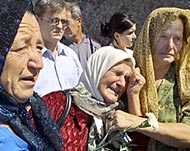UN prosecutors wrap up Milosevic case
UN prosecutors have wrapped up their case against Slobodan Milosevic more than two years after the former Yugoslav president first went on trial on war crimes charges.

“The prosecution case is hereby closed,” The Hague-based UN war crimes court said in a statement on Wednesday.
The prosecution wrapped up its case two days early to avoid
further delays in the trial, which has been interrupted on numerous occasions because of the poor state of health of the 62-year-old Milosevic.
It follows the announcement that presiding judge Richard May will step down in May because of an undisclosed illness, a move that is likely to lead to more delay and could even result in a new trial, although this is a remote possibility.
War crimes
Milosevic has been on trial since February 2002 on more than 60 counts of war crimes and crimes against humanity for allegedly masterminding the wars in Croatia, Bosnia and Kosovo that led to the break-up of Yugoslavia in the 1990s.
Judges ruled that Milosevic, the first former head of state to
face international justice, should start presenting his defence on 8 May in the biggest war crimes case since World War II.
If convicted he faces life in prison.
But proceedings at the International Criminal Tribunal for the
former Yugoslavia (ICTY) have had to be halted repeatedly, with Milosevic diagnosed with high blood pressure and said to be at risk of a heart attack.
Last week chief prosecutor Carla Del Ponte said she was happy with the prosecution case which has lasted for a marathon 293 court days and seen more than 300 witnesses testify, including victims, politicians, diplomats and members of the former Yugoslav leader’s inner circle.
“I am satisfied, we have succeeded in showing the responsibility of Milosevic,” she said.
Massacre charges
 |
|
Milosevic is charged of the |
The prosecution has been able to show that “Milosevic controlled Serbian and federal Yugoslav institutions and that he played a crucial role in the conflicts,” said Dutch lawyer Heikelina Verrijn Stuart.
However, many legal experts question whether the prosecution has shown enough proof to convict Milosevic on the genocide charges he faces for the bloody 1992-95 war in Bosnia that left more than 200,000 people dead.
The charges concern the 1995 Srebrenica massacre of more than 7500 Muslims, the worst atrocity on European soil since World War II whose main suspects, wartime Bosnian Serb leader Radovan Karadzic and his military commander Ratko Mladic, remain at large.
Prosecutors have to show that genocide, the most serious of all war crimes charges, took place and that Milosevic had the intent to commit the crime.
Evidence
|
“I am satisfied, we have succeeded in showing the responsibility of Milosevic.” |
Del Ponte said she knew genocide would be difficult to prove but argued she had enough evidence to include it in the indictment and laughed off suggestions it would be a personal failure for her if Milosevic escaped conviction on that charge.
“In all trials… there are charges like this one, with the
genocide for Milosevic, that I could have dropped from the
indictment myself, but I do not want that responsibility. This
responsibility lies with the judges,” she said.
A final ruling in the case is still years away and May’s sudden
resignation, effective 31 May, is a major setback for the court.
Under tribunal rules, if a judge resigns the proceedings can
either be continued with a new judge or the whole trial must start again.
Milosevic, who is representing himself in court, is likely to
reject a continuation and demand the case is heard anew to frustrate what he has repeatedly denounced as a political trial.
However, it is expected that his objections will be overturned
on appeal if judges rule it is “in the interest in justice” to
continue the proceedings.